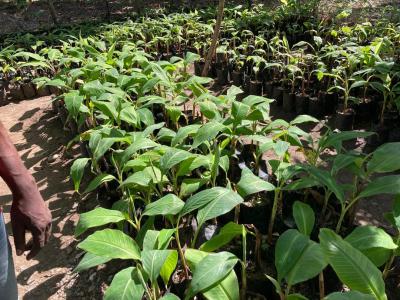
Haiti continues to appear in unsettling news reports. There is a new presidential council which seems to have already split into factions. The violence in the capitol continues unabated, with many Haitians living in fear, and most with life-threatening food insecurity.
There are many root causes to the current chaos; a primary one is extreme poverty. People who are desperate do desperate things. They join armed groups, they cut down their trees for cash and fuel, they give their children away to institutions, they migrate. Addressing the desperation is the way forward. Quixote Center’s approach to Haiti is:
- Support community-led economic development that leads to increased income, small business development, and economic self-sufficiency.
- Advocate in the United States on targeted policies and with government offices that impact the ability of ordinary Haitians to live in dignity and economic self-sufficiency.
- Capacity-strengthening for Haitian institutions so that they are empowered to lead Haiti’s future.
Together with our partners, and with your support, our work takes place in two geographical areas: Gros Morne (in the north) and Gouin (in the south).
Gros Morne is our long-term programming partnership. The main partner is the JMV (Grepen) Center operated by the Haiti Province of the Montfortain priests. Quixote Center provides funds to maintain the mountainside reforestation project, a tree nursery, and a demonstration farm that the Grepen Center uses for training, and to sell its produce locally to support their own work.
We are working to expand this work, with the goals to:
- strengthen the capacity of Grepen Center to sustain itself and free it from dependency on outside assistance;
- support additional projects that increase household income for rural families.
Under current circumstances, making this happen has been slow and incremental, but still happening. These projects are under development:
- Plantains. Grepen Center launched this last year and aims to expand it over the next two years to reach more producers. Plantains are a main food and cash crop, they are very prolific, they improve soil quality, and they add to the tree cover. Grepen Center cultivates seedlings and sells them below local market prices but still enough to make a profit for themselves, improving their self-suficiency. Farm families increase production, leading to more cash as well as better food security.
- Veterinary care. Farm animals are a food crop as well as a cash crop. Improved vet care means more animals to eat and sell. Grepen Center will source vet medications in bulk at lower costs than people can obtain on their own, and thus provide animal care at lower costs. Grepen will charge for the medications and it will bring in funds for them as well. We expect this project to launch this month, if all goes as planned.
- Fish ponds. Grepen Center will establish tilapia ponds to sell for food locally and provide income for Grepen Center. If successful, the project will improve food security, and we hope to fund a pilot later this spring or summer.
- Mango processing factory. A main cash crop for Gros Morne-area farmers is mangoes, and until this year the customer was the United States. Citing insecurity, the USDA cancelled the export contract. This led to increased food insecurity, and has also led mango growers to lose hope and to start cutting down their trees to sell for cooking fuel. The Montfortains have the idea to process mangoes into juice as well as dried for local sale and consumption, to diminish dependency on the export market. This is on hold until they can figure out how to source a juicing machine. If successful, it would economically lift up the whole area. We believe this is the type of project that Haiti needs.
Gouin. In partnership with DCCH, a part of Caritas in the south, based outside of Les Cayes. We began with a community study, that included focus groups, interviews with leaders, etc., to get their perspective on what it would take for the community to earn enough money to sustain itself. Together with DCCH, they came up with a three-year program:
- Increase crop yield and diversify crops
- Increase and improve farm animal care and breeding
- Support small commerce
Part a is the first year and will reach 600 families. The beneficiaries may not be the same each year; supporting commerce reaches primarily women, for example. The plan includes very close monitoring of specific success indicators, including a 20% increase in household income and the ability to pay school fees for their children. DCCH is a very experienced partner and the project is ready to go. We have a commitment for part of it, and are seeking funding for the rest.
Advocacy
A second and equally important root cause of the current chaos is the presence of weapons trafficked from the United States. Haiti does not produce guns or ammunition; yet the gangs terrorizing the population are fully armed. The United States government is providing equipment to the Haitian National Police, but at the same time our government has not put a stop to the trafficking of weapons by criminal elements. A 2023 United Nations report traced the origin of weapons in Haiti to 5 states in the U.S. with lax gun laws. Cartels purchase weapons and traffic them out through the chaotic Miami River port.
Working to end the trafficking of weapons to Haiti and elsewhere in Latin America and the Caribbean (where it also fuels gang violence) is Quixote Center’s top advocacy priority in Haiti. We have formed and are facilitating a coalition of partners and together we are visiting Members of Congress and jointly releasing actions (see below) and statements. Two additional pieces of legislation on this issue are on the table, and you will see an updated action from us in the next few weeks.
We don’t believe that it is credible that the Department of Homeland Security is unable to stop weapons from leaving Miami River. We aim to hold them accountable.
Thank you for your support. None of this would be possible without it.


